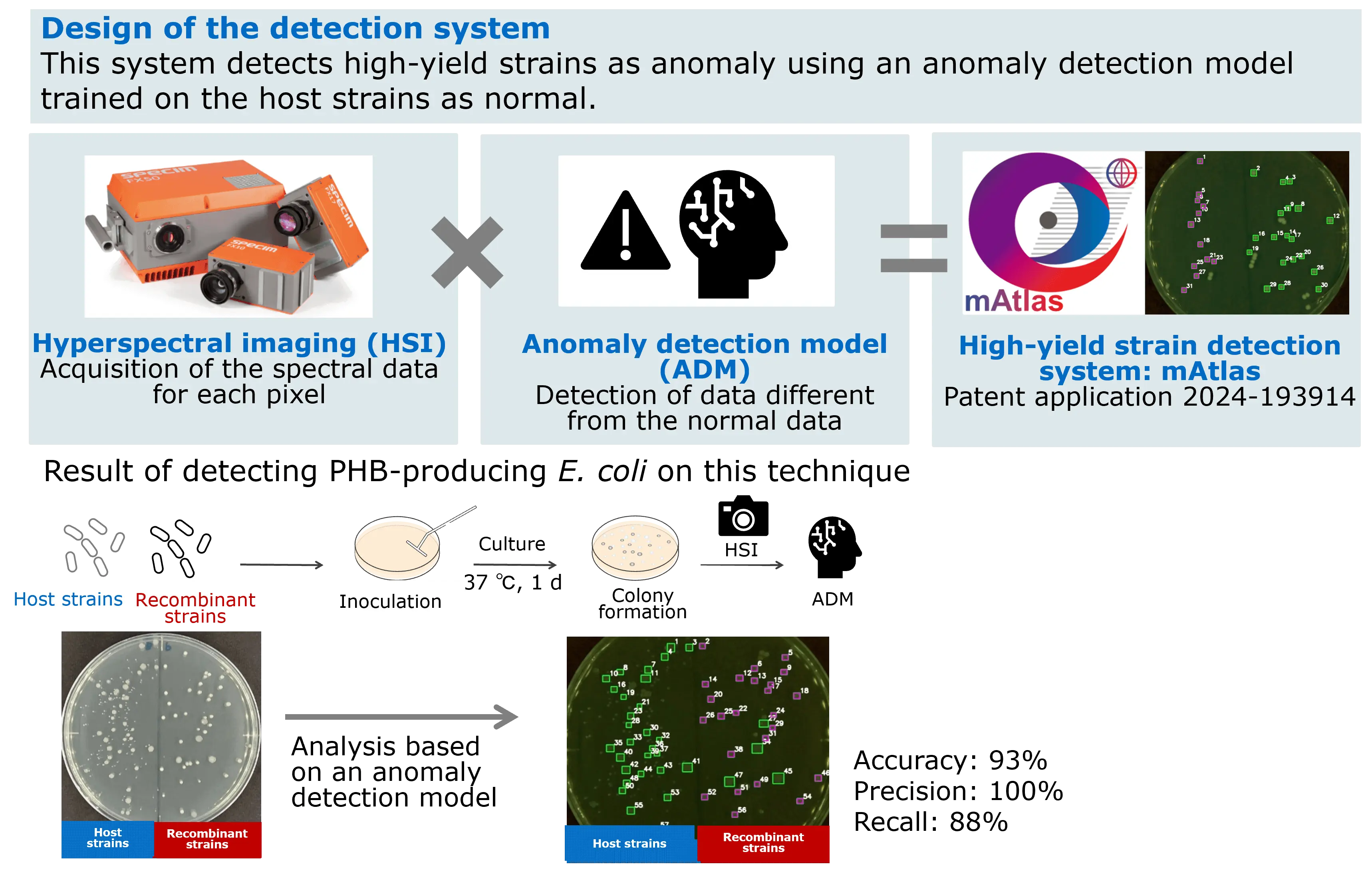News Releases
Konica Minolta’s High-yield Strain Detection System for Biomanufacturing Wins the Hot Topics Award at the FY2025 Annual Meeting of the Japan Society for Bioscience, Biotechnology, and AgrochemistryUtilizing Hyperspectral Imaging and an Anomaly Detection Model
April 23, 2025
Tokyo (April 23, 2025) - Konica Minolta, Inc. (Konica Minolta) today announced that one of its researchers gave a presentation on the Company’s high-yield strain detection system for biomanufacturing at the FY2025 Annual Meeting of the Japan Society for Bioscience, Biotechnology, and Agrochemistry (organized by the Japan Society for Bioscience, Biotechnology, and Agrochemistry; March 4 to 8, 2025) and won the Hot Topics Award, one of just 30 winners out of 1,786 general presentations.
The Hot Topics Award is conferred to presentations containing information which is released at the annual meeting of the Japan Society for Bioscience, Biotechnology, and Agrochemistry for the first time and which has a scientific or social impact.
“A High-yield Strain Detection System Using Hyperspectral Imaging and an Anomaly Detection Model,” which was presented by the researcher, was highly evaluated for its social impact, alignment with the purpose of bioscience, biotechnology, and agrochemistry, and scientific level.
The presentation arose from joint research by the Konica Minolta-AIST Bioprocess Technology Cooperative Research Laboratory (Bioprocess Research Lab), which was jointly established by Konica Minolta and the National Institute of Advanced Industrial Science and Technology (AIST) in 2023.
Representative Awardee
Konica Minolta, Inc.
Yu Watari, Research Strategy Center, Technology Development Headquarters
“I am truly honored and grateful to receive such a prestigious award, which is the result of tremendous effort made by the staff of the Bioprocess Research Lab,” said Watari. “This recognition inspires me to continue working to help create a sustainable society by combining Konica Minolta’s core technologies and AIST’s comprehensive strengths.”

Research Theme
A High-yield Strain Detection System Using Hyperspectral Imaging and an Anomaly Detection Model
Background and Overview of the Research
Biomanufacturing aims to produce useful substances by utilizing microbes and other living organisms. It is attracting growing attention as a key technology to achieve carbon neutrality by producing materials without using fossil fuel-based materials.
To achieve practical application of microbe-based material production, a technology for developing microbes that can produce desired materials efficiently (high-yield strains) is important. While a comprehensive technology to mass-produce recombinant strains has been established thanks to progress in genetic engineering in recent years, a means of efficiently detecting microbes capable of mass-producing materials among recombinant strains is still under development.

In this research, a system capable of detecting E. coli that efficiently produce polyhydroxybutyrate (PHB), which is a type of biodegradable plastic, with an accuracy of 93% was successfully developed by combining hyperspectral imaging (HSI)*1 and an anomaly detection model.*2
Previously, microbe detection systems combining HSI and machine learning were reported. However, it was necessary to prepare recombinant strains as training data in advance because these systems used classification and regression models. In this technique, HSI is used to digitize visual information, such as the color, shape, and gloss of microbes, and an anomaly detection model, which was built by using original microbial strains (host strains) as normal strains for training, is used to detect high-yield strains as abnormal strains.
This makes it possible to automatically detect high-yield strains without bias only by capturing images of colonies*3, eliminating the need to comprehensively evaluate the production capabilities of recombinant strains, thus greatly increasing the efficiency of developing high-yield strains. The combination with robotics technology is also expected to realize a more advanced autonomous extraction system.
About the Bioprocess Research Lab
The research lab was established by Konica Minolta and the AIST Group in June 2023 with the aims of solving production engineering issues that may arise regarding stability and scaling up bioprocesses, and implementing next-generation bioproduction management systems for the production of highly functional materials using microbes.
The Bioprocess Research Lab is developing monitoring technology for the production of innovative complex materials and solving issues toward the practical application of biomanufacturing by upgrading sensing technologies, AI technologies, and their combination as imaging IoT technologies, all of which have been refined by Konica Minolta, and harnessing and integrating AIST’s comprehensive strengths.
Konica Minolta will keep contributing to building a sustainable society, including carbon neutrality, by solving issues toward the practical application of biomanufacturing.
*1 A nondestructive measurment method to identify various materials and define their properties by using a hyperspectral camera developed and sold by Konica Minolta
*2 A technology to detect data whose behavior is different from most data accumulated through machine learning
*3 A cluster of cells which is visible to the naked eye due to proliferation of a single microbe or a small number of microbes (mainly bacteria and fungi) on a solid culture medium (such as an agar medium)
